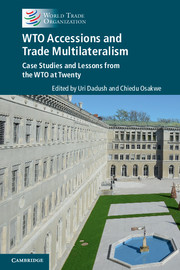Book contents
- Frontmatter
- Dedication
- Contents
- List of contributors
- Foreword
- Acknowledgements
- List of abbreviations
- Editors' note
- PART I WTO accessions, the trading system and the global economy
- PART II Overview: systemic outcomes from accessions
- PART III Members’ perspectives on accession negotiations
- PART IV Working party chairpersons’ perspectives on accession negotiations
- PART V Salient features inWTOAccession Protocols
- PART VI Conclusion
- Annex: Contributor biographies
- Index
- Plate section
Foreword
Published online by Cambridge University Press: 05 November 2015
- Frontmatter
- Dedication
- Contents
- List of contributors
- Foreword
- Acknowledgements
- List of abbreviations
- Editors' note
- PART I WTO accessions, the trading system and the global economy
- PART II Overview: systemic outcomes from accessions
- PART III Members’ perspectives on accession negotiations
- PART IV Working party chairpersons’ perspectives on accession negotiations
- PART V Salient features inWTOAccession Protocols
- PART VI Conclusion
- Annex: Contributor biographies
- Index
- Plate section
Summary
Welcoming new members to the WTO is a highlight of my position as Director-General. The tangible sense of pride that I have felt from acceding governments – and their expectations of what membership will mean for their citizens – is a reminder of the importance of the multilateral trading system. Thirty-three new members have joined the WTO since it was established in 1995. At the time of writing we have 161 members, covering 98 per cent of the global economy, and there are over twenty more countries in the process of joining.
Increasing the membership of the WTO has always been a priority for our organization – not as an end in itself, but as a means to extend the coverage of multilateral trade rules. When a new country goes through the process of integrating into the multilateral trading system, we see tariffs lowered, market access increased, and the principles of non-discrimination, transparency and predictability extended. In addition, in the WTO's dispute settlement system, new members have access to one of the most highly regarded bodies in international law to help them to resolve trade disputes in a fair and objective manner. The overall effect of increasing the membership is therefore to boost growth and increase stability in the global economy.
This book seeks to tell the story of WTO accessions and show the importance of our work in this area. Over fifty contributors from inside and outside the WTO assess the results of our efforts and how they have served the trading system. As a result, these pages contain a mix of analysis, experience and lessons for the future. They highlight the value of accessions in increasing market access, supporting domestic reforms and contributing to rule making in the WTO.
The contributors include chief negotiators of original members; chief negotiators of members which have acceded since 1995; highly regarded economists, lawyers and academics; and experts from the WTO, World Bank, International Monetary Fund and the International Trade Centre.
In considering our work on accessions we should recall the genesis of this organization. The WTO was first conceived as part of the post-war Bretton Woods framework of global economic governance, with the aim of achieving greater openness, prosperity and stability among nations. This remains central to my vision of the WTO today.
- Type
- Chapter
- Information
- WTO Accessions and Trade MultilateralismCase Studies and Lessons from the WTO at Twenty, pp. xvii - xviiiPublisher: Cambridge University PressPrint publication year: 2015



